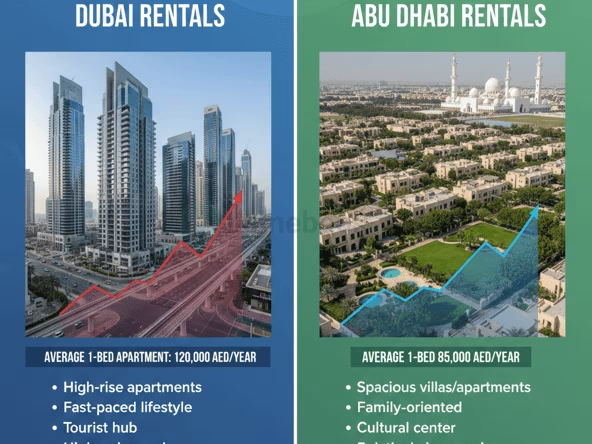Renting a home in Dubai is rarely a straightforward affair. The city’s skyline is dazzling, the communities are world-class, but the rental prices can leave many expats and locals feeling stretched. The good news?
With the right timing, you don’t have to pay top dirham. Knowing when to begin your search can literally save you thousands each year. The Dubai rental market has its own rhythm, shaped by the weather, expat arrivals, and even the school calendar.
Rents rise sharply when demand surges, then soften during quieter periods when landlords are keen to fill vacant apartments. For new residents, it often feels like a gamble: one month, the same flat can cost far more than the next. But if you understand the cycles behind these shifts, the odds suddenly tilt in your favor.
In this guide, we’ll unpack how the Dubai rental market works, highlight the best time to rent in Dubai, and explain why prices fluctuate from season to season.
You’ll also pick up practical tips on negotiation and timing—so whether you’re hunting for luxury in Downtown or chasing cheap rent in Dubai in more budget-friendly areas, you’ll know how to secure the best deal.
Many tenants who pay attention to timing discover that the best time to rent in Dubai isn’t always obvious, but with planning, you can secure surprisingly cheap rent in Dubai compared to those who rush.
How the Dubai Rental Market Works
Dubai’s rental market doesn’t move in a straight line. it rises and falls depending on who is arriving, when they are arriving, and how many new homes are available. During cooler months, when tourists flood in and companies hire more expats, demand for housing goes up.
Landlords often push prices higher at these times, knowing tenants have fewer options. By contrast, in the hot summer, many people avoid moving altogether. Apartments may sit empty, and that’s when landlords are more willing to negotiate or lower rents.
The difference between short-term and long-term rentals also shapes the market. A short-term flat in Marina can double in price during a major event, while a one-year lease in Deira might barely move.
When a new tower or community is completed, the extra apartments suddenly add to the choices on the market. With more supply competing for tenants, rents often ease and renters gain the upper hand.
Landlords play their part too. A unit left vacant for several weeks costs them money, so they might offer deals like flexible payments or a month rent-free just to fill it. On top of that, government oversight has grown stronger.
The Real Estate Regulatory Authority (RERA) issues rental guides that give both landlords and tenants a sense of what’s “fair,” which helps limit sudden spikes.
If you’re looking in high-profile areas like Downtown, JBR, or the Palm, don’t be surprised if rents jump around a lot. Demand in these spots can change quickly, and prices follow. In contrast, places such as International City or Karama tend to be more affordable. They’re usually steadier too, even if they do shift a little when the whole market moves.

The Best Times of Year to Rent in Dubai
When you’re flat-hunting in Dubai, the calendar matters just as much as the neighborhood. Prices don’t stay steady all year. They rise when demand is high, then dip when people aren’t moving. Knowing the best time to rent in Dubai gives you leverage, especially if your goal is to secure cheap rent in Dubai without compromising on location.
If you can time it right, you’ll find cheaper rents and more room to negotiate. The sweet spots usually fall in the scorching summer, right after the big holidays, and when the school year ends.
Each of these moments shifts supply and demand, and that’s when renters gain an advantage.
Summer Months: When Demand Drops
Nobody enjoys moving house in 45-degree heat. That’s why summer tends to be quieter. Flats stay empty longer, and landlords would rather accept a lower offer than wait months for a tenant. This is the season when you can ask for discounts or flexible payment plans and often get them.
Post-Holiday Periods
After Eid or New Year, the market catches its breath. Families settle down, people return from trips, and very few want to pack boxes right away. That break is good news for renters. With fewer people hunting, landlords don’t want their flats sitting empty. Many will cut the rent a little or throw in an incentive just to secure a tenant.
End of the School Year
As the academic year wraps up, many families switch homes. They move closer to schools or leave the city altogether. Suddenly, you see more villas and bigger apartments available. With that fresh supply on the market, tenants looking at the right time can strike a better deal before demand picks up again.
Why Rent Prices Fluctuate Throughout the Year
Rent in Dubai rarely stays the same for long. Several moving parts make it rise or fall — knowing them helps you spot when to hunt for bargains.
First, expat inflows & economic opportunity. When new companies open, or visa policies become easier, more people move in. More demand pushes rents up. Haus & Haus noted that a surge of professionals in 2025 is a main reason rental rates are rising.
Second, tourism & seasonal occupancy. In the “winter” (around October to March), the weather improves, visitor numbers grow, people want short-term rentals, and even long-term demand edges up. That boost gives landlords room to raise rent. PHOREE observes this in short-term units, where occupancy can jump up in those months.
Third, supply swings. When many new buildings or communities are completed at once, the supply suddenly increases. More units available means renters have more choice. That tends to pull rents down, especially if demand doesn’t keep up.
Fourth, cost pressures & inflation. Maintenance, utilities, and service charges all cost more over time. Landlords often pass some of this onto tenants. Over recent years, overall rent across the UAE has risen by nearly 25-30% over a few years, driven in part by rising costs.
Finally, regulatory / market mood changes. Example: if regulations cap how much rent can increase, that limits how fast landlords can push rates during demand peaks. Or if there’s news of an economic downturn, people defer moving, and demand drops temporarily.
How Planning Ahead Can Save You Money
If you start early, you give yourself options. Waiting until the last minute usually means fewer flats, more competition, and higher prices. Begin your apartment search at least 2-3 months before you move. That way, you can monitor vacancy trends and see when landlords begin dropping their rates.
Check listings regularly. Use websites like Homebook. Compare what similar flats in the same area are renting for. If you notice one is overpriced, you’ll spot it faster when you know the average. (Tight market knowledge gives you power in negotiations.)
Be ready to move fast when a good deal shows up. Have your documents in order — proof of income, ID, and references. Landlords often prefer tenants who are ready, so being prepared can get you small perks like rent reductions or waived fees.
Set your numbers before you even start looking. Don’t just think about the monthly rent — add in utilities, service charges, even the deposit. That way, when you see a flashy apartment that looks great but is way over budget, you won’t get carried away.

Areas in Dubai Where Timing Matters Most
Some neighbourhoods move with the market more sharply than others. If you know which ones, you can plan better and maybe catch a deal.
Luxury zones like Downtown, Dubai Marina, and JBR tend to see big swings. In peak months (usually winter), demand shoots up. Many people want prestige, views, proximity — they’ll pay for that. But when the weather is very hot, or in off-peak months, these same areas can become quieter. Landlords don’t want prime flats sitting empty, so they reduce rent, offer perks, or get flexible about terms. For instance, recent data shows rents in Dubai Marina may drop by roughly 5-7% or more during summer slowdowns.
On the other side, more affordable districts — Deira, Karama, International City — are steadier. There are still fluctuations, but they tend to be smaller.
In Deira and Karama, rents don’t swing as wildly. They may edge down a little in quieter months, but you won’t see the steep drops common in Marina or Downtown. For instance, some Deira apartments slipped around 5% earlier in 2025.
If you’re chasing a luxury flat, summer or right after the holidays is when you’ll find landlords more willing to talk. In the budget areas, timing still helps, but the real trick is watching listings closely and asking about extras — maybe a free parking spot, or easier payment terms.
Tenants looking for cheap rent in Dubai often find that affordable districts like Deira or Karama give better long-term value, especially if they move during the best time to rent in Dubai, such as the quieter summer months.
Tips for Negotiating Better Deals Based on Timing
Spot vacant units landlords want filled
Keep an eye out for apartments that have been listed for a while or showing “ready to move in.” If a flat sits empty for too long, landlords often prefer getting some rent rather than none.
Older buildings with lots of competition from new units are especially likely to be flexible.
Use market downturns to your advantage
When demand drops (e.g., during summer, off-peak periods), you have more room to negotiate. Landlords are more willing to lower rent or offer perks.
Don’t wait until everything else is scarce. Start conversations early. Sometimes just asking “What’s your best rate if I sign now?” can open a door.
Offer longer commitments if rates are lower
If you can stay for 1-2 years, tell the landlord. Committing longer often gives you leverage to ask for a better rate, fewer cheques, or even some bonus like free parking.
Useful phrases renters can use
- “Is the rent negotiable?”
- “I saw a similar unit nearby for less — would you consider matching it?”
- “What kind of incentives can you offer if I sign a longer lease?”
- “Would you accept fewer cheque payments?”
- “If I move in quickly, is there any discount or waived fee you’d offer?”
Common Mistakes Renters Make When Timing Their Search
| Mistake | What goes wrong | How to avoid it |
| Waiting until the last minute | You end up with a few options. That pushes you into accepting higher rent or poor conditions because you’re in a rush. | Start looking 2-3 months ahead. Monitor listings early so you know what’s typical pricing is and what deals pop up. |
| Ignoring seasonal trends | You rent during peak periods (cool months, holidays) when many people compete. Rents are higher. | Be aware of when demand drops (summer, just after big holidays). Time your move so you have a better chance at lower rent or incentives. |
| Not negotiating | Tenants assume the first offer is final. Many landlords expect negotiations, especially when units have been vacant or demand is weak. | Ask if the rent is negotiable. Show that you know market rates. Propose a fair counteroffer or ask for extras (parking, fewer cheques, etc.). |
Conclusion
When you’re renting in Dubai, timing can make or break your budget. Prices jump around with the weather, school calendars, and the flow of new arrivals. The trick is to start your search early, watch for the quieter months, and ask for a deal — you’ll often avoid the steepest rents that way.
Luxury areas reward patience in summer, while budget districts give steady options if you keep an eye out for incentives. In the end, knowing when to look is just as important as knowing where to look — and it can save you thousands of dirhams.




